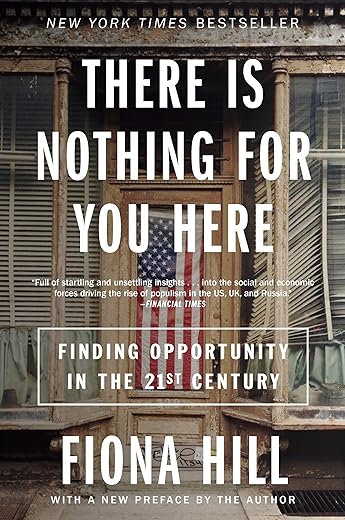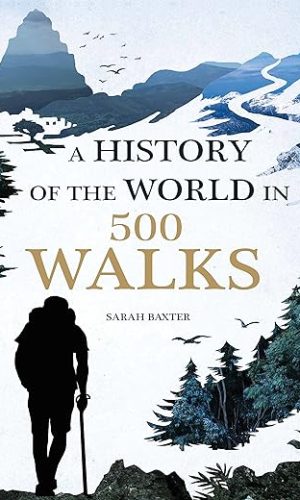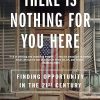There Is Nothing for You Here: Finding Opportunity in the Twenty-First Century
£10.99£12.99 (-15%)
“This book has a miraculous quality…. As a memoir this is hard to put down; if you are seeking a better American future you should pick it up.”—Timothy Snyder, New York Times best-selling author of On Tyranny
INSTANT NEW YORK TIMES BESTSELLER | A celebrated foreign policy expert and key impeachment witness reveals how declining opportunity has set America on the grim path of modern Russia—and draws on her personal journey out of poverty, as well as her unique perspectives as an historian and policy maker, to show how we can return hope to our forgotten places.
Fiona Hill grew up in a world of terminal decay. The last of the local mines had closed, businesses were shuttering, and despair was etched in the faces around her. Her father urged her to get out of their blighted corner of northern England: “There is nothing for you here, pet,” he said.
The coal-miner’s daughter managed to go further than he ever could have dreamed. She studied in Moscow and at Harvard, became an American citizen, and served three U.S. Presidents. But in the heartlands of both Russia and the United States, she saw troubling reflections of her hometown and similar populist impulses. By the time she offered her brave testimony in the first impeachment inquiry of President Trump, Hill knew that the desperation of forgotten people was driving American politics over the brink—and that we were running out of time to save ourselves from Russia’s fate. In this powerful, deeply personal account, she shares what she has learned, and shows why expanding opportunity is the only long-term hope for our democracy.
“Of every book written by anybody associated with the Trump administration, in any way, [this] is absolutely the one to read.”—Rachel Maddow
A New York Times Bestseller | A Washington Post Bestseller | A Washington Post Notable Book of the Year | A Financial Times Best Book of the Year
Read more
Additional information
| Publisher | Mariner Books (11 May 2023) |
|---|---|
| Language | English |
| Paperback | 448 pages |
| ISBN-10 | 0063269082 |
| ISBN-13 | 978-0063269088 |
| Dimensions | 13.49 x 2.57 x 20.32 cm |










by Barnowljenx
I found the analysis of industrial decline in the UK, the USSR and the USA very interesting. Fiona Hill is well qualified to set these out as she came from a deprived area in the UK and studied in the USSR as that organisation collapsed and then studied and worked in the USA visiting the many deprived areas there. I had not thought to correlate the experiences of these 3 quite different countries and was taken by how similar they were in that respect. I did find the final chapters covering what to do to address these issues was very worthy but not nearly as interesting as the earlier part of the book. Sorry!
by Robert Davies
Well written personal account of her life.
However, the constant blaming of Margaret Thatcher for the problems of the North East with only a belated and small acknowledgment of the wider economic situation did become tedious.
Moreover, I found myself wishing that she had provided some comparative data on how
the challenges of educating the less well-off are tackled in other rich countries such as France, Germany, Australia and Canada.
Her insights into the Trump presidency are brilliant, if scary, and I for one would have liked more thoughts on how to deal with some of the issues that modern democracy are throwing up.
by Beaandtig
A post industrial memoir that tracks the North East of England and our US comparator states to look at the impact of the end of heavy industry on individuals, communities and society. At heart a defence of education and the need for opportunity for all. Also, behind the scenes views of the horror of the Trump administration and a look at Putin.
by Jon W
The early part of this book is the story of how Fiona courageously pulled herself out of an underprivileged background. Unfortunately, the rest is about a clash of cultures. Fiona the academic and Trump the autocrat. There are a few insights.
by Daniel Jones
This is a very important book for anyone wanting to understand the background to the divisive politics of our time. A remarkable first hand account of growing up facing all the obstacles to opportunity for those left behind and then making it to becoming a senior White House advisor on Russia for three Presidents. Chilling first hand account of the chaos of the Trump era and how populists have no answers. Lots to think about what liberal democracies need to do to counter the growing inequality of financial capitalism and how the West need to wake up to the true threat from Putin’s Russia. Very impressive.
by Annie Collins
This book gives a eye opening view on the education and opportunity for your average state school kids in 1960 and onwards in the UK. It also explains quite clearly why Trump got into power and why, shocking though it may seem, he may very well get into power again. Lengthy book but well worth reading. It makes you look again at the people in power around you and whether or not they just might be economical with the truth if it suits them. Food for serious thought or serious food for thought, probably both.
by Pat Bradford
The book provides insight from personal experience in a number of areas. Whilst the overall message focuses on inequality, its cause and possible actions to start to remedy, it also details what Trump’s presidency involved and how inequality fuels popularise but fails to address the needs of those backing popularism.
by Frank
This book was recommended to me and I read the reviews expecting to understand how the US government works and its relationship/strategy to Russia and Putin in particular. The problem was that these areas were seriously lacking and the book seemed to concentrate so much on how difficult it has been for Fiona to achieve equal opportunities due to her working class background and her birthplace. While the points she makes provides reminders to us all of how class system the UK is and how racial profiled the US the book seems to go on and on about it to the point it became tiresome and even boring. I think Fiona feels hard done by but feel her skills seemed honed to only working for “think tanks” or governments. She refers to many “think tanks” and government departments but we are given no guidance how these fit into the overall workings of the state which makes it difficult to retain interest in the matters she raises, and it becomes very academic and dry. She now seems lost in a world of “think tank” speak only understood by them and this is linked to her working class background at every opportunity. There is a brilliant book in there somewhere but it seems to have lost its way and become a rambling view of how Fiona views herself and how the world treats her. I look forward to her next book to see if she can provide a cogent story of her work and the world. I feel its an opportunity lost and she needs to tell her story without the constant harping on about misogyny and class apartheid in the UK.